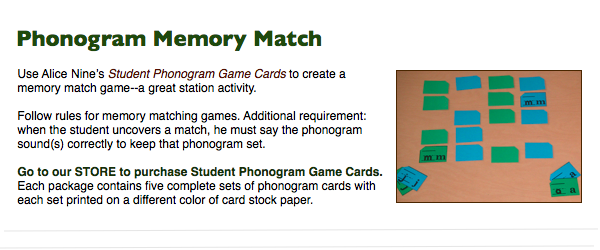Elementary Workshops

Johnny Can Spell
Learn how to integrate instruction and practice in phonemic awareness, phonetics, penmanship, and spelling, supporting development of encoding and decoding skills. Read More
Bilingual Phonics Instruction
A two-day event that gets right into the classroom with model teaching and practicums. Training covers how to teach systematic, explicit phonics in the bilingaul (English-Spanish) classroom. This workshop is a modification of Johnny Can Write. Read More
Johnny Can Write
Instructional strategies address multi-sensory and learning styles as students act out parts of speech, rules of grammar, and functions of sentence elements. Parsing, an old strategy with a new twist, provides for quick and easy grammar reviews. Diagramming is used as a visual map during sentence analysis and composition. A question guide enables students to effectively elaborate sentences through the appropriate use of modifiers and through structural changes in the sentence. Target grades: 1-5. Read More
GRAM-MARvelous
Instead of using worksheets or textbook exercises, teach grammar with multi-sensory, student-engaging activities. This workshop equips teachers to incorporate a dynamic worksheet-free approach to grammar instruction. Anchor lessons, interactive grammar charts, and daily learning routines are used to teach about parts of speech, kinds of sentences, writing conventions, and sentence fluency. Target grades: 3-7. Read More
Words at Work
Teachers appreciate the “make & take” part of this workshop that makes it possible to leave the training and immediately introduce three dynamic literacy centers: Word Webs, Poetry Words, and Breadcrumbing. In addition to the construction and operation of these centers, Alice Nine shows teachers how to incorporate the work done in these centers into student writing. These three centers support practice with multiple meaning words, figures of speech, and word associations. Dictionaries and graphic organizers are used as students brainstorm, confer, organize, and evaluate with a partner. Center activities are easily modified for whole group learning situations. Targeted grades: 2-5. Read More
Vocabulary Builders
Experience easy to do activities that develop critical word-learning strategies–word chunking, word connections, use of context clues, and dictionary skills. These activities are brain-based alternatives to worksheets. Students can work in small groups, pairs, or individually. Activities work well not only for language arts, but also for other core subjects. This workshop is customized according to grade levels taught by participants, grades 3-12. Read More
How We Write
Learn how to use sentence writing in to teach anchor lessons about the writing process, the vocabulary of writers, and the skills for drafting, conferring, revising, and editing. Explore easy ways to teach writing conventions and sentence variety. Examine how to chart student thinking and learning. Great ideas for mini-lessons for writers’ workshop. Target grades: 1-4. Read More
Write with Color
Think out of the box. Using the five senses, think descriptively about common things and common places. Use these ideas to create a “color poem.” Target grades; 1-5. Read More
Sentences under Construction
Do not think about right or wrong; just play with sentences. Zoom-in and zoom-out, creating long flowing sentences or very short skeleton sentences. Use puppets, sentence codes, and drama to understand the different kinds of sentences–those based on purpose (declarative, interrogative, etc.) and those based on clause structures (simple, compound, etc.). Use sentences from author’s as models. Target grades: K-6. Read More
Transforming Sentences
A day of instructional activities and skill strategies to improve revising and editing skills! Use applied grammar as a tool for revising and editing. Experience practical activities for sentence combining. Examine revision strategies. And review grammatical structures. Sentence work will focus on coordination, subordination, reduction, and apposition. Target grades: 4-12. Read More
English Phonics for the Spanish Speaker
Phonemic awareness is a fundamental key for language acquisition. This one day event shares practical information and exercises with teachers for developing phonemic awareness in Spanish speaking students. The sounds of English and Spanish are introduced with special attention given to phonemes which are more difficult for native Spanish speakers to identify and produce. Read More
The Sounds and Symbols of English
Examine the basics of teaching systematic, explicit phonics with handwriting for a multi-sensory approach. Review the 70 common English phonograms. Experience simple but effective instructional strategies that complement any reading program. Target grades: PreK-3. Read More
Sentence Mapping
Give old-fashioned sentence diagramming a new twist as a visual tool to improve writing. Use graphic symbols–hearts on verbs, stars on conjunctions, pins on prepositions–to identify sentence elements and to understand how they work in a sentence. Use line diagrams to prescribe sentences or to analyze sentences. Great ideas for mini-lessons for writers’ workshop. Target grades: 3-7. Read More
Spell SMART
Instead of assigning word lists and testing word lists, teach students how to Think to Spell–a word analysis process that focuses on phonograms, syllables, morphemes, and rules of language. Use this approach with Johnny Can Spell support materials, or incorporate it into an adopted spelling program. Target grades: 1-6. Read More
Handwriting
Learn the basics to successfully teach students how to hold a pencil and how to form letters. Examine the habits of handwriting and ways to help students improve. Find out how to use the clock face as a backdrop for letter formation, a strategy that helps eliminate reversals. Know the connection between manuscript and cursive and enable your students to master cursive. Understand the importance of handwriting instruction. Target grades: PreK-4. Read More
CUstomize training for your school or district
If your district or school is interested in scheduling professional development with N.I.N.E. Enterprises, please contact us; call 1-800-791-8962 or email at johnny@nine-enterprises.com.
WHY SHOULD YOU BRING A WORKSHOP TO YOUR DISTRICT?
- It is a great team building event
- Training is individualized to your unique situation
- Scheduling is customized for your convenience
- Minimize teacher time out of the classroom
IS ON-SITE TRAINING EXPENSIVE?
- Dynamic staff training at your location at a very reasonable price
- Valuable training that costs less than the consumable workbooks it makes unnecessary
- Eliminate the cost time and travel with on-site training
HOW MUCH TIME IS NEEDED FOR THE TRAINING?
- Most trainings are one- or two-day events with opportunities for follow-through inservices
- Customize the schedule to meet your needs
- To some extent, one could say that our training schedules are made-to-order. We work closely with the host school or district scheduling to meet their calendar needs.
WHAT TRAINING MATERIALS WILL BE NEEDED?
- Purchase only what you need
- Costs for teacher materials vary per training event.
- Teacher materials are put together in packages. However, you may choose to purchase item by item, mix and match as you see fit.
- View teacher materials in our STORE
WHO DO I CONTACT TO SCHEDULE PROFESSIONAL DEVELOPMENT?
Training events are arranged with Alice Nine; call 1-800-791-8962 or email at alice@nine-enterprises.com. Visit our CALENDAR for scheduled events.
